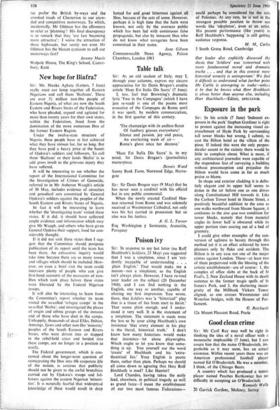New hope for Biafra?'
Sir: Mr. Nweke Agbata (Letters, 7 June) really must not lump together all Eastern Nigerians and call them 'Biafrans'. There are over 51 million non-Ibo people of Eastern Nigeria, of what are now the South Eastern and Rivers States of the Federation, who have pleaded, argued and agitated for more than twenty years for their own states, within the Federation, freed from the domination of the more numerous Ibos of the former Eastern Region.
Under the twelve-state structure of Nigeria these people have at last achieved what they have striven for, for so long. But they have paid a heavy price at the hands of Ojukwu's soldiers and followers. To call them 'Biafrans' or their lands 'Biafra' is to add gross insult to the grievous injury they have suffered.
It will be interesting to see whether the report of the International Committee for the Investigation of Crimes of Genocide, referred to in Mr Auberon Waugh's article of 30 May, includes evidence of atrocities and genodical acts committed by General Ojukwu's soldiers against the peoples of the South Eastern and Rivers States of Nigeria. In fact it will be interesting to learn whether the 'investigating team' visited these states. If it did, it should have collected ample evidence and information which may give Mr Waugh, and others who have given General Ojukwu their support, food for con- siderable thought.
If it did not visit these states then I sug- gest that the Committee should postpone publication of its report until the team has been there. An exhaustive inquiry would take time because there are so many towns and villages which should be included. How- ever, on even a brief visit the team could interview plenty of people who can give first-hand accounts of the massacres of non- Ibos which took place before these states were liberated by the Federal Nigerian troops.
It will also be interesting to learn from the Committee's report whether its team visited the so-called 'refugee camps' in the so-called 'Biafra', and investigated the places of origin and ethnic groups of the inmates and of those who have died in the camps.
Unhappily, thousands of dead Efiks, Ibibios, Annangs, Ijaws and other non-Ibo 'minority' peoples of the South Eastern and Rivers ' States, who were driven into or trapped in the rebel-held areas and herded into these camps, are no longer in a position to testify.
The Federal government, which is con- cerned about the longer-term question of reintegrating the Ibos into alb corporate ;life of the nation, is anxious that publicity should not be given to the awful brutalities carried out by Ojukwu's troops and fol- lowers against the eastern Nigerian 'minori- ties'. It is naturally fearful that widespread knowledge of these would result in deep
hatred for and great bitterness against all Ibos, because of the acts of some. However, perhaps it is high time that the facts were known, not only by the overseas public which has been fed with continuous false propaganda, but also by innocent Ibos who do not know what savageries have been committed in their name.
June Gibson Commonwealth News Agency, Palace Chambers, London SW1






































 Previous page
Previous page